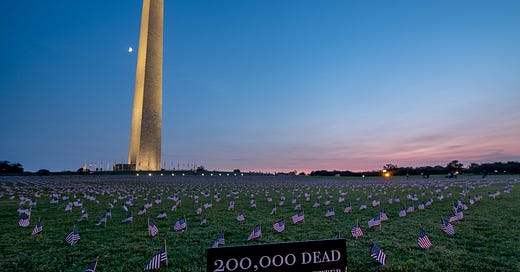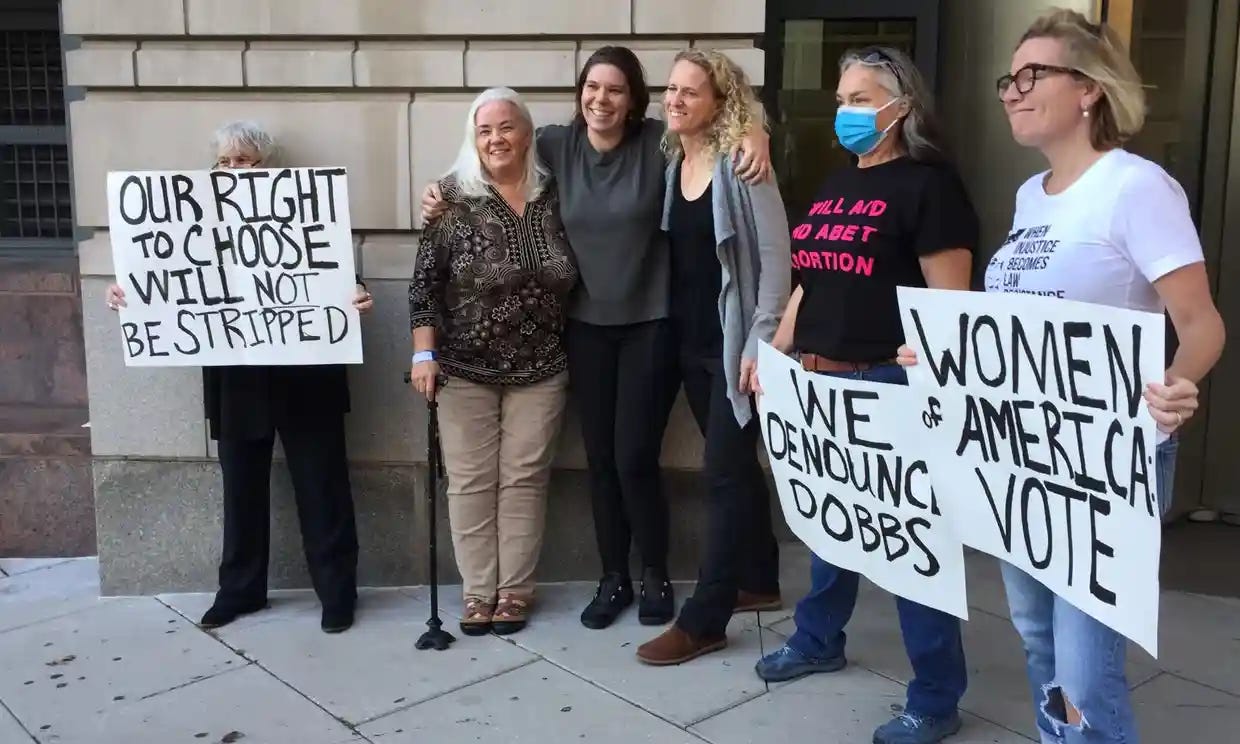What do Covid mortality and abortion criminalization have in common?
And more fun questions this week!
Welcome to Not a Doctor. I’m Melody Schreiber, a journalist and the editor of What We Didn’t Expect: Personal Stories About Premature Birth. I’m not a doctor, or a scientist, or really an expert of any kind. I just like to ask questions and try to find the answers to them.
🌡️🌡️🌡️
This week, I focused on two difficult but important topics: Who is dying of Covid, right now, today? And what happens in a country where abortion — and those who support it — is increasingly being criminalized?
The two issues, while separate in these stories, reveal a disturbing theme: The U.S. has the highest number of confirmed Covid deaths in the world and the highest incarceration rate of any nation. USA! We’re #1!
But these stories also show, I fervently hope, how we can do better — what we can do to address many of the disasters outside of our direct control.
Who is dying from Covid now, and why?
Today, about 335 people will die from Covid. How is that possible, with vaccines, treatments, precautions, and recovery from prior cases?
This is something I think about a lot. Much of my writing has focused upon systemic failures to keep people safe. People are dying — and suffering illness and long-term effects — because the U.S. has made purposeful decisions not to protect them.
We could be doing much more by upgrading ventilation; making vaccines and treatments more accessible, not less; offering sick leave; and adopting precautions like wearing masks and taking rapid tests regularly, just to name a few. Instead, our leaders have decided that the pandemic is over.
Photo: Angela N.
But who are those 335 people that we are losing every single day? For Scientific American, I looked at who is dying right now. And what I found surprised me, even though I’ve been reporting on these issues for nearly three years now.
Older people
People over the age of 65 are now dying at higher proportions than any other point in the pandemic, including spring 2020. That is awful. There’s a really helpful graphic in the story that shows what the proportions look like, and it’s stunning. There is a price of much of the country moving on, and it is exacted with the lives of older Americans.
People in rural areas
At the end of September, people living in rural areas were dying at rates 92.2 percent higher than urban areas. That gap has narrowed as the death rate has fallen, but there’s still a significant difference in outcomes based on where you live.
People of color
American Indians, Alaska Natives and Pacific Islanders have had the highest death rates this entire time. While the difference in some groups, like Black Americans, are not as pronounced as they have been at other times, inequity in death is expected to skyrocket once again in the next surge.
Unvaccinated, and unboosted, people
We know that unvaccinated people have a significantly higher risk of death from Covid than vaccinated people. But did you know that falling behind on boosters is another significant risk factor?
In July, 39 percent of Covid deaths were among people who had one booster or more. People over 50 who are vaccinated and have just one booster are three times more likely to die than people with two or more boosters.
People who can’t access treatments
Did you know there are treatments that dramatically reduce your risk of severe illness and death? Did you know it’s completely free — for now? Do you know where you can get it, if you fall ill? If you do, you are in a small minority.
This summer, only 11 percent of people who tested positive for Covid reported being prescribed antivirals, despite much of the country being eligible for them based on risk factors like age, preexisting conditions, overweight, and more. And soon, these treatments won’t be free anymore, and they may be much harder to access if pharmaceutical companies don’t have a big guaranteed buyer like the federal government.
Americans
Living in America is a risk factor for dying of Covid. We have inaccessible, expensive health care (if we’re lucky enough to have health care at all). We have low rates of trust in government officials, which leads to poor uptake of vaccines and the abandonment of most precautions.
The U.S. has the highest number of confirmed Covid deaths of any country. There have been 1.2 million excess deaths here since February 2020, losses that have reshaped almost every part of American life.
But we are also so lucky in so many ways. We have access to (free!) vaccines and treatments, we know how to improve air quality and which masks are best, and we know exactly what we need to do to protect those we love: continue taking illnesses like these seriously, and doing everything we can to keep ourselves safe.
A night of ‘hell’: Abortion activists on their ‘inhumane’ detention in DC
Pregnant people, medical providers and others increasingly face criminalization after the Dobbs decision on reproductive care.
Three women who peacefully protested against restrictions on abortion rights in the US supreme court were mistreated and detained in “inhumane” conditions after their arrest, they told me.
They were transported in suffocatingly hot, coffin-like vehicles, and then kept in cells that resembled dog kennels, with blood and feces smeared on the walls, they said. They were denied calls to their lawyers, given little food and water, and withheld medical attention for hours.
At one point, the women — including a 71-year-old great-grandmother with a mobility disability who uses a cane — were put in ankle, waist, and wrist manacles.
Here’s the thing, though: Peaceful protesters don’t even need to be detained. The women could have been set free after their arrest, as they don’t have a history of violence or a risk of not appearing for their trial. In fact, when a judge finally arraigned them, she released them with no bail.
The U.S. already has the highest incarceration rate of any nation in the world. One in 166 Americans are in prison right now. And the increasingly criminalization of abortion means more people may encounter the horrific conditions the protesters detailed — all because they needed health care.
I don’t know what else to say. I hope we can build a better world. I hope we can learn to value and protect life, especially those who have been pushed to the outskirts of society.
Photo courtesy of Emily Paterson
“I’ve never done anything like this. I’ve never been arrested in my entire life,” one of the abortion protesters, Emily Paterson, told me. But “women got the right to vote because of similar kinds of protests — peaceful non-violence — and Jim Crow ended because of peaceful non-violent protest.”
“We have a responsibility,” Paterson said. “Nothing will change if we don’t use our power.”
🌡️🌡️🌡️
As ever, please leave a comment or email me (melodyaschreiber@gmail.com) if you have any questions or thoughts. If you liked this post, don’t forget to hit the little heart below. And if you know someone who might appreciate this newsletter, please forward it to them!
Stay safe, and be kind.






I always learn something new from your posts. Thank you